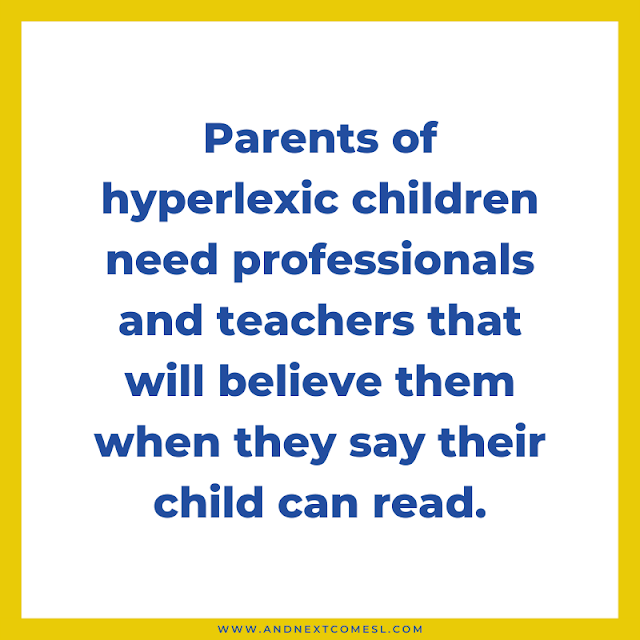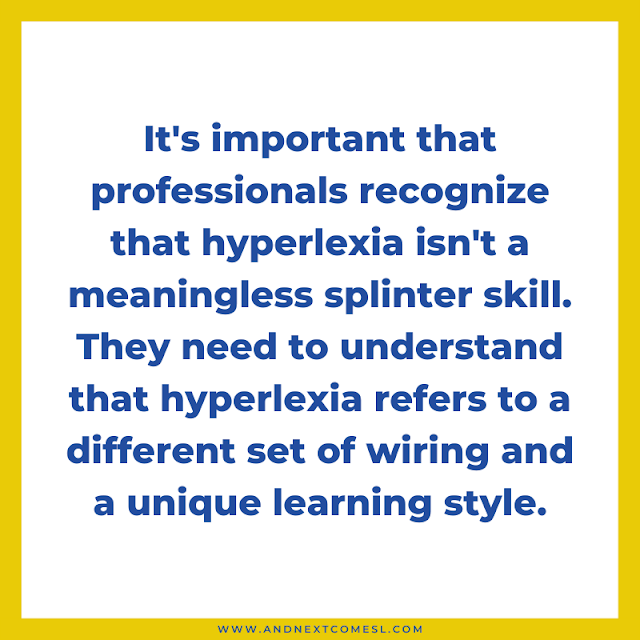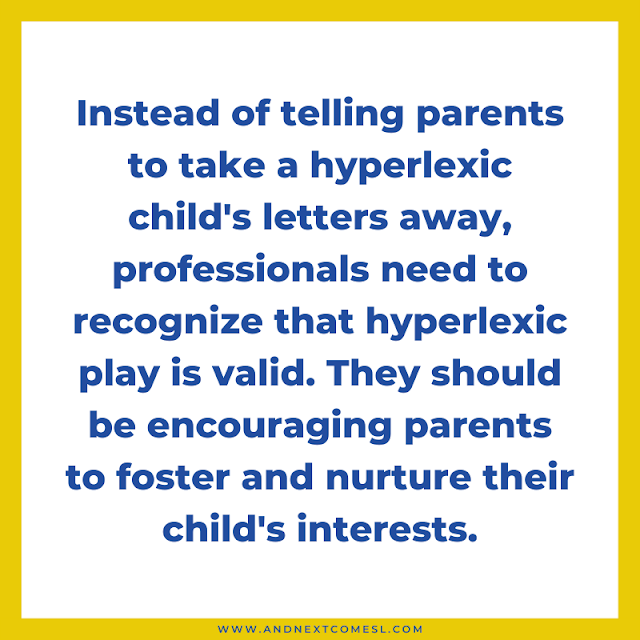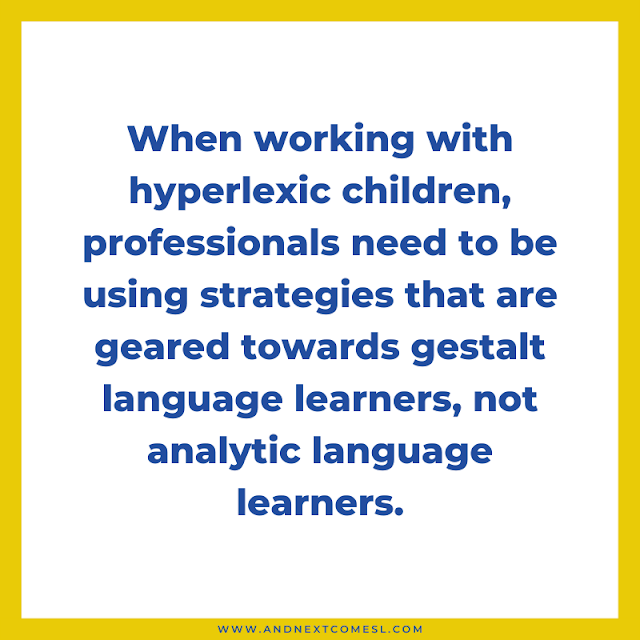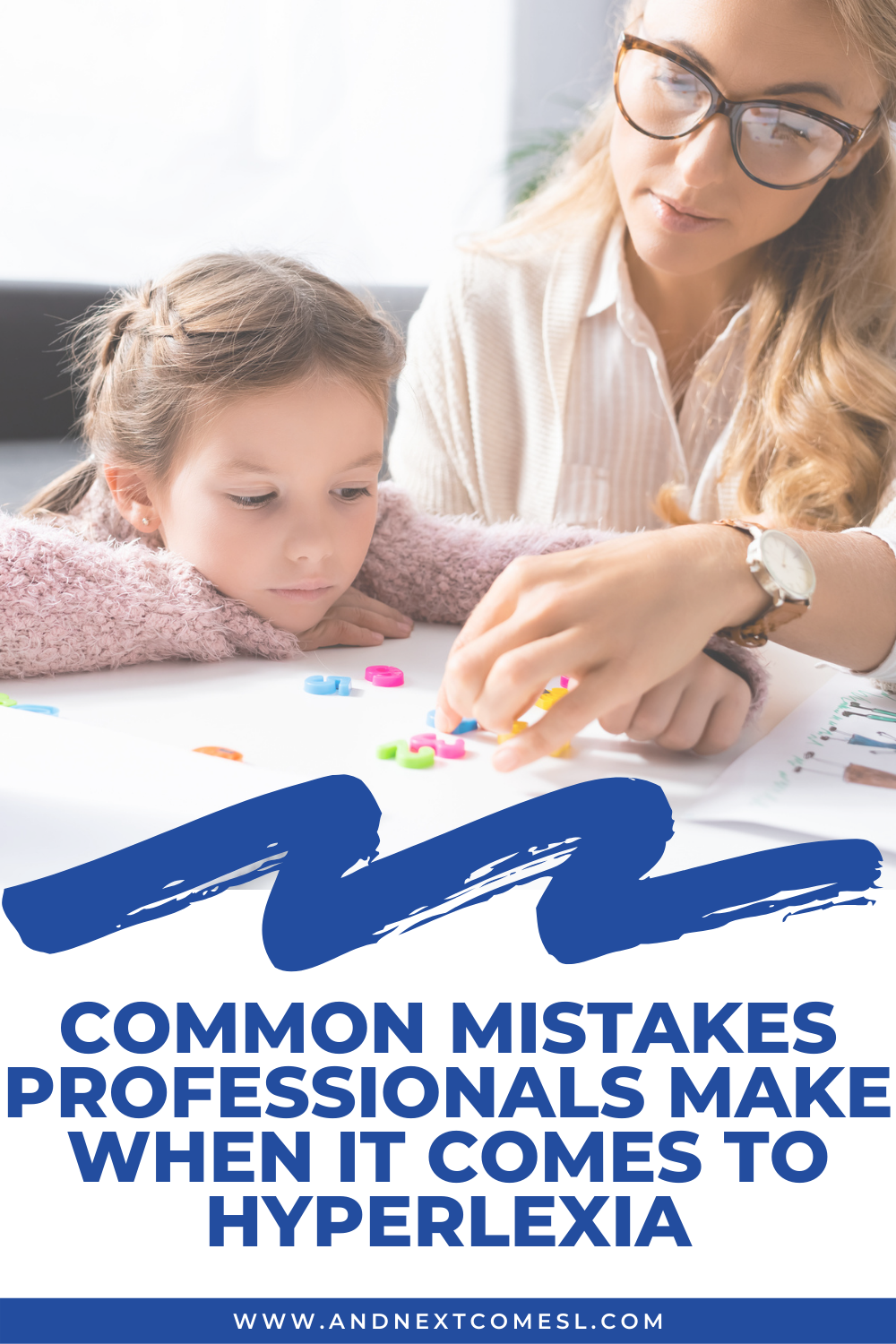When speaking with other parents of hyperlexic children, there are quite a few themes that come up time and time again.
Things like, "I asked them about hyperlexia, but they dismissed my concerns."
Or "My son's therapist told me to take away letters. Has anyone done this?"
It's incredibly frustrating that so many parents of hyperlexic children are not getting the support and help they need for their child and/or are being given inappropriate advice. Okay, terrible advice, who am I kidding.
I mean it's clear that hyperlexia is misunderstood by many. Not surprising given how few have actually heard of it in the first place. But those who have heard of it, often have a limited understanding.
So, I want to discuss and dissect some of the more common mistakes that professionals are making when it comes to hyperlexia. I'll also provide insight into why they are problematic and what we should be aiming for instead.
I'm warning you now that this is a long read!
Is Your Hyperlexic Child's Therapist or Specialist Making these Mistakes?
Here are some of the most common mistakes that I see professionals and therapists making when it comes to hyperlexia. They are the red flags you should be watching out for.
Mistake #1: They brush off or dismiss the possibility of hyperlexia
One of the biggest complaints I hear from other parents is that every professional they talk to is quick to dismiss hyperlexia. They say things like "Oh they only label that in the US" or "That's not a real thing." It makes my head want to explode!
Hyperlexia is very real.
It also comes along with its own unique set of challenges. Challenges that parents are seeking support and help with. So to have their concerns dismissed is incredibly frustrating and invalidating. And it delays their child from getting the help and interventions that they might need.
So, if you are a professional, please listen to parents' concerns and recognize that hyperlexia is a thing. Do some reading on it.
If you're a parent, it's totally okay to seek a second or third opinion. It's also important to remember that self-diagnosis is a valid option as well. After all, any professional or therapist who dismisses hyperlexia isn't likely to be a good reliable resource for you and your hyperlexic child. You're not going to receive the support and care you are looking for.
Mistake #2: They don't believe you when you tell them that your child can read
While similar to the points above, many people simply won't believe you when you tell them that your toddler can, in fact, read.
They'll roll their eyes and give you a big old "Sure, Jan..." Basically, the equivalent of "Pffft...every parent thinks their kid is gifted and they aren't!"
They'll assume that your child has just memorized the book and can recite it word for word. Until they, of course, see your child read a book they've never seen before word for word. Then they'll all of sudden be like, "Did you know he can read?!" Um yes, I told you he could. You just didn't believe me...
So please believe parents when they tell you that their toddler can read. Because, like I've mentioned, hyperlexia is a very real thing. Sure it's a rare thing, but these kids do exist and we need professionals to believe us.
Mistake #3: They consider hyperlexia a splinter skill of autism
One reason why some professionals are quick to dismiss hyperlexia is because they think it's a meaningless splinter skill, which is untrue.
Unfortunately, I think that this falsehood stems from Treffert's problematic types of hyperlexia where he writes that type 2 hyperlexia is seen as a splinter skill. But remember that Treffert's types do not have research to back them up, are a product of his time, and are ableist in nature at the best of times. Just to name a few problems...
I mean, Treffert himself even contradicts his own subtypes.
Yep, the guy who said type 2 hyperlexia is a splinter skill also writes, "Rather than being marginalized or trivialized as a 'splinter skill,' clinicians should embrace the hyperlexia and capitalize on its value as a treatment tool." (source)
But dude, you're the one who trivialized hyperlexia as a splinter skill in the first place!
Anyway, criticisms of his proposed types aside, hyperlexia should be thought of as its own thing - and not as a splinter skill - much like dyslexia is.
In the Hyperlexia: Therapy that Works manual, Adkins et al. write, "A savant or splinter skill is an isolated ability that appears within individuals with developmental disabilities. Generally, these skills have no relationship to other aspects of the individual's functioning. Hyperlexia is not an isolated skill, but a tool which can be used to develop language, to modify behavior and to help the individual make sense of the world." (source)
So, to sum up, hyperlexia is not a splinter skill or savant skill. Instead, it is an entirely different brain wiring and a unique learning style. Which has been confirmed by fMRI studies, just an FYI.
Mistake #4: They tell you to take away your child's letters
I know I've written and spoken about this particular topic a lot.
However, it's one that needs to be said over and over until so called specialists stop giving this advice to parents.
Any therapist or professional who tells you take away your hyperlexic child's letters is wrong. Full stop.
If you've been given this advice, then take it as a sign that that "professional" does not truly understand hyperlexia. Nor do they have your child's best interest in mind.
Besides a recent study on hyperlexic traits found that "the higher the letter and number skills of children with ASD, the better their comprehension." (source) And we already know that comprehension issues are common in hyperlexic kids. So taking away their letters could further exacerbate a common issue.
And that's in addition to the trauma, lack of respect, shaming, etc. that could result from you taking away their letters.
Just leave them be. Hyperlexic play is valid.
You can learn more about what to do instead of discouraging letter play here.
Mistake #5: They aren't incorporating a child's interests or are withholding a child's interest
Sometimes therapists might use first/then charts where they withhold a child's interest until the child does something else (something usually undesirable) first. Basically, first do this sucky thing you don't want to do and then I'll let you play with these awesome alphabet toys, but I'm going to leave them visible anyway to taunt you (or so called "motivate" you...) while you do the boring task.
As Salazzo et al. (2021) noted in their research, "The early hyperlexic traits represent an ultimately useful skill as letter and number knowledge is part of necessary school learning. Therefore, it is conceivable to take advantage of them in order to support children with ASD in their areas of weakness...children's strengths should be supported in early intervention in autism, and not simply considered as reinforcers during social routines." (source)
Simply put, you should be using the child's interests instead of withholding them.
With a little creativity (and maybe some help from Pinterest), you can find lots of different ways to incorporate a child's interests into whatever it is you're trying to teach them instead of relying on first/then approaches where the interest is withheld.
So, to sum things up, it's best to incorporate the child's interests into therapy sessions and not make them the reward for doing other tasks.
Mistake #6: They use strategies that are geared towards analytic language learners instead of gestalt language learners
Hyperlexic kids are gestalt language learners. Basically, they learn in chunks.
Unfortunately, many professionals and therapists aren't familiar with or properly trained in gestalt processing. Instead, they're more familiar with the analytic learning style. So, they use strategies that are designed to support this particular learning style and not ones geared towards gestalt learners.
It would be like using a butter knife to cut an apple instead of using a sharp knife or an apple cutter. You have to use the right tools for the situation.
As Ostrolenk et al. (2017) write in their hyperlexia systematic review, "If hyperlexia is part of the language learning sequence of autistic children, attempting to replace it by typical instruction is likely to not succeed." (source)
So when it comes to hyperlexic kids, you need to be using strategies that are geared towards gestalt learners.
A good first step is learning about natural language acquisition (start with this book or dive deep with this course and handbook) and recognizing that echolalia is functional communication, which leads me to my next point...
Mistake #7: They think that echolalia isn't functional and should be discouraged
This is a big one. So many professionals think that echolalia is something meaningless and should be discouraged.
However, as Sussman (2012) says, "Echolalia is a good sign. It shows your child's communication is developing." (source)
Basically, echolalia is a sign that a child is learning language differently. It is a sign that they're gestalt language learners. So they need strategies that are tailored to their different way of learning (see previous mistake).
What you need to be doing is supporting hyperlexic kids by helping them break down their gestalts (or echolalic word chunks) and teaching them how to recombine and isolate these gestalts before you can build up their grammar. That is, you're using their echolalic phrases, modeling new ones, and helping them move through the natural language acquisition phases.
Additionally, when you recognize that echolalia has meaning, you're showing that you honor and respect the hyperlexic child's attempts at communication. That's kind of a big deal, don't you think?
Again, if you learn about natural language acquisition, then you'll learn how to properly support hyperlexic kids who communicate primarily through echolalia. I highly recommend taking this course from Meaningful Speech to learn more about how to help hyperlexic kids move from echolalia to self-generated, spontaneous language.
So, to Recap these Common Mistakes...
Professionals who work with hyperlexic kids and their families should:
- Listen to parents' concerns and recognize that hyperlexia is a real thing instead of dismissing the possibility of hyperlexia
- Believe parents when they say that their kid can read
- Recognize that hyperlexia isn't a meaningless splinter skill and is instead a different set of wiring and a unique learning style
- Encourage hyperlexic kids to play with their letters instead of telling parents to take their child's letters away
- Incorporate a child's interests into therapy sessions, specific tasks, and whenever they're trying to teach new skills
- Use strategies that are geared towards gestalt language learners
- Recognize that echolalia isn't meaningless and is, instead, a sign that the child is learning language differently




